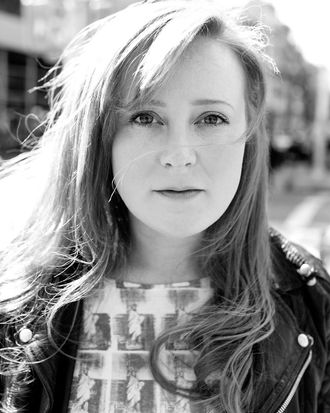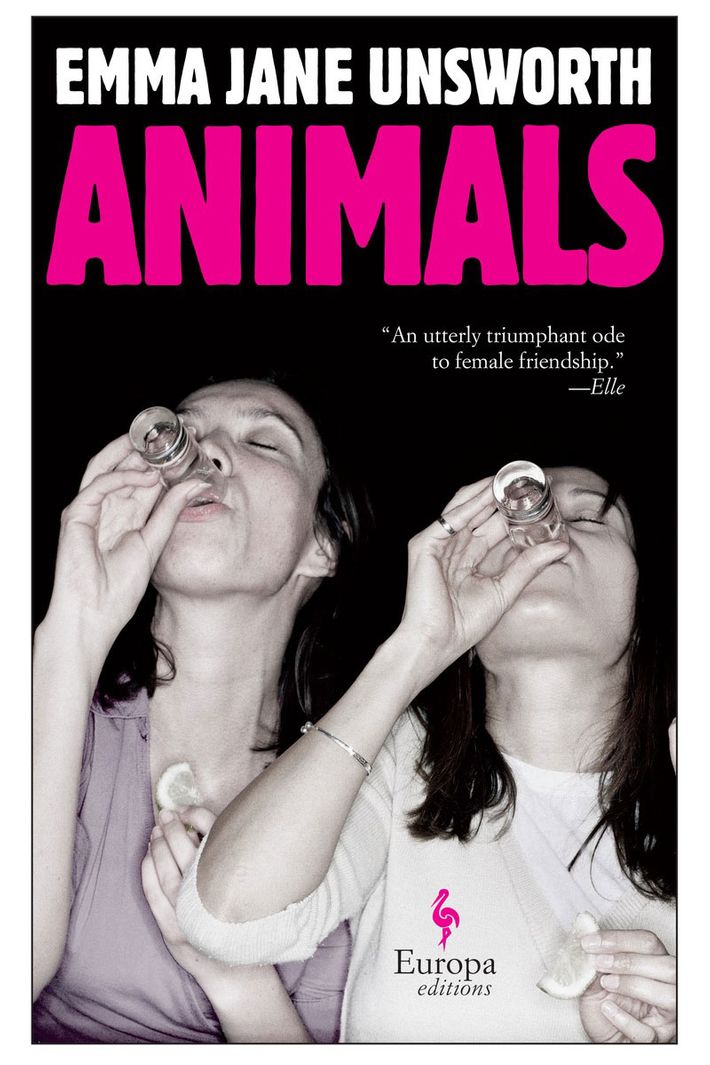
“You know how it is. Saturday afternoon. You wake up and you can’t move.”
So begins Animals, a critically acclaimed British novel that reached the U.S. this month. Emma Jane Unsworth’s story of two smart, bored women in the English city of Manchester is a tale of blurry parties, disputes with drug dealers, and sour-mouthed hangovers. The misadventures of Laura and Tyler, both hovering around the age of 30, are described in thrilling, nauseating detail.
Caitlin Moran has called the book “Withnail with girls” — name-checking the 1987 cult movie Withnail and I, which followed two unemployed actors leading a debauched, alcoholic life in London. Unsworth is delighted by the comparison: “It’s that idea of two friends who are just dicking around, but philosophizing as well,” she says. “But of course they’re exploring different things to Withnail, because they’re women. No one would ever have said to him, ‘Hey, shouldn’t you be thinking about cutting down on the lighter fluid, and having a baby?’”
It’s a problem that Laura, the protagonist of Animals, keeps bumping up against. She’s caught between Tyler, an American friend with an unquenchable thirst for trouble, and Jim, the sensible fiancé who wants to settle down. The book raises questions about wild women: when we should choose healthy living over the tempting possibilities of a night out, and why our lifestyles are subject to external scrutiny in a way that men’s rarely are.
Unsworth spoke to the Cut about her no-holds-barred writing style, her problem with the movie Trainwreck, and why she’s tired of cautionary tales for women.
Some of your descriptions of Laura and Tyler’s escapades make for uncomfortable reading. Did you know when you set out to write the book that you were going to be that unflinching?
I guess I broke an ancient rule of novel writing, which so many people warned me against. They said, “Don’t start a book with a hangover or someone waking up, because it’s a cliché, and it’ll never get sold.” But that was just what felt right. Laura is tied up in the opening scene, and that symbolized so much: this is a girl who is sabotaging herself, and is in the constraints of her own life. I think that I wanted to make it grim and disgusting for the humor, as well. I wanted to go to the farcical extremes of their roguish adventures. I wanted it to be a bawdy, picaresque story of these two women who were on a quest that’s no more noble than just to get trashed, and I wanted to go with them on that mission.
Do you think there are elements of Laura’s experience that apply generally to women around the age of 30?
I think I wrote a coming-of-age story, the irony being that Laura’s already 32. It’s an age where you often feel trapped, because maybe you haven’t got the great job, you haven’t got married yet, you haven’t had kids, you haven’t done all these things that tell you that you are a successful human being. So you’re stuck in a protracted adolescence. But part of me thinks, so what? Why can’t you just stay in that phase? Why do you let the conditioning around you tell you that you’re a failure or a tragedy in some way?
All that said, Laura does have problems. But what I wanted to show was that her problems are not necessarily what society would perceive from the outside. She’s not an addict — this is a recreational thing that she’s doing. Her problems have to do with the fact that she’s holding herself in a kind of stasis. She’s in denial and she’s tearing around the city and intoxicating herself, and she’s in these oppressive relationships because she’s too scared to stand still and look at who she might be if she stopped being the train wreck.

What did you think of the movie Trainwreck?
I loved it. I thought it was so funny and much-needed, and I think Amy Schumer is a pioneer and a genius — but my heart sank at the point when she gave away all her booze. Her problems, as far as I could see, weren’t related to alcohol. They had to do with what her dad had told her, and the way she was handling her relationships.
Hollywood is really guilty of making “badly behaved” women go through some kind of redemption process, and a moral realization about how bad they are. I think it’s absolutely connected to what we do with our bodies. The pressure to be biologically productive is slammed on women in their 20s and 30s so hard that you end up feeling that if you’re not having a baby, then you’re some kind of mess, to be looked down upon.
I knew that I didn’t want Animals to be a cautionary tale. Female characters in Hollywood have to find romantic fulfillment after their wild, boozy days, and that’s their trajectory to success and a valuable life. I’m not prepared to have that, and I don’t think it is particularly helpful to the cause. If you’re not an addict, then I think you should be able to do what you want to yourself.
Laura’s boyfriend, Jim, is keen for her to start looking after her body and her fertility. What’s your take on that dynamic?
Jim very much represents that big wagging finger from the sky, saying, “Shouldn’t you be calming down a little bit, dear?” It’s the idea that you can’t possibly, as a woman, want to do anything with your body other than make it healthy and lovely for procreation. Jim starts pressuring Laura to behave in that way by trying to guilt-trip her. Women are meant to feel guilty if we don’t fall in.
I was in the supermarket last week looking at birthday cards for my friend who’s going to be 40, and all the cards were just so feeble and resigned and apologetic, it made me want to scream. I’m sick of people telling me that it’s time to change my life because I’m 36 now — no, thanks, I’ll keep partying. I’m in absolute denial about my age and I intend to stay that way until they put a lid on me. I refuse to be backward-looking and say, “Those were the days. Remember when we used to be wild?” I’ve still got plenty ahead of me on that front.
This interview has been edited and condensed.




